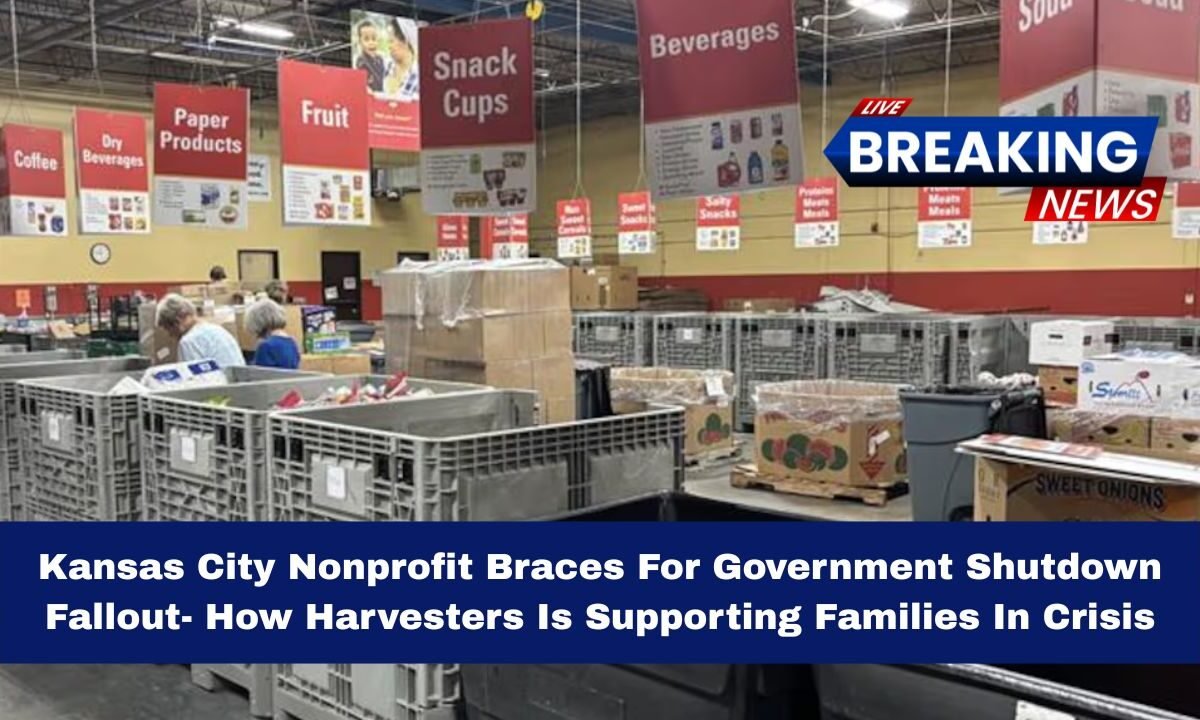As the government shutdown continues to impact families across the United States, one Kansas City nonprofit is stepping up to help.
Harvesters – The Community Food Network is preparing for a surge in demand as thousands of federal employees and low-income households face growing financial uncertainty.
The nonprofit’s staff and volunteers are expanding operations, collecting donations, and reminding Kansas Citians that no one should go hungry, regardless of their situation.
The Growing Crisis
Kansas City’s local economy is home to tens of thousands of federal employees, many of whom could soon miss paychecks if the shutdown persists. That loss of income pushes families who were already struggling closer to food insecurity.
Elizabeth Keever, Chief Resource Officer at Harvesters, explained that food insecurity in the region is at its highest level in a decade, and the shutdown could make the situation worse.
“The moment the shutdown occurred, we knew there would be a spike in food insecurity,” said Keever. “We are already facing an unprecedented need.”
With grocery costs and utility bills continuing to rise, the number of families needing emergency food assistance has grown sharply since the pandemic. The shutdown has only added another layer of stress for households trying to make ends meet.
Harvesters’ Response Plan
Harvesters operates across 27 counties in the Kansas City metropolitan region, serving families in both Missouri and Kansas.
The organization distributes millions of pounds of food each year through a network of partner pantries, mobile markets, and community programs.
To prepare for the increased demand caused by the government shutdown, Harvesters is taking several steps:
- Expanding Mobile Food Distributions: Setting up additional food drop-off and drive-thru locations to reach affected families.
- Increasing Volunteer Shifts: Encouraging Kansas Citians to give their time to sort, package, and deliver food.
- Partnering With Local Businesses: Seeking donations of shelf-stable goods, fresh produce, and hygiene items.
- Reinforcing SNAP Support: Helping residents understand how to apply for or continue receiving SNAP (food stamp) benefits.
- Encouraging Community Donations: Reminding residents that even small monetary contributions can make a huge impact.
Keever also stressed the importance of compassion: “We’re a strong community, and we take care of one another. When we say ‘Midwest nice,’ we mean it.”
Key Facts About the Situation
| Category | Details |
|---|---|
| Organization | Harvesters – The Community Food Network |
| Counties Served | 27 counties across Kansas and Missouri |
| Primary Challenge | Rising food insecurity due to the federal shutdown |
| Federal Workers Affected | Tens of thousands in Jackson County and nearby regions |
| Current Food Demand | Highest level in the past 10 years |
| Response Efforts | Mobile pantries, volunteer programs, food drives |
| How Residents Can Help | Donate, volunteer, or spread awareness through community outreach |
A Call to Action
Keever urges those in need not to hesitate to seek help. “If you need food assistance right now, don’t be afraid to ask. We are ready and willing to help anyone—whether you’ve been impacted by the shutdown or were already struggling.”
The organization also encourages residents to volunteer as a way to reconnect with their community. “Volunteerism builds relationships,” Keever said. “It’s a reminder that even small actions make a big difference.”
Harvesters offers volunteer opportunities at multiple warehouse and distribution centers. Community members can sign up to help sort donations, pack meal boxes, or distribute food directly to families.
The Bigger Picture
While the current crisis is driven by the shutdown, it highlights a broader issue: food insecurity remains a persistent challenge across the Midwest. Rising inflation, higher grocery prices, and stagnant wages have left many households struggling to afford basic necessities.
Local nonprofits like Harvesters fill critical gaps in the social safety net, but their work depends on ongoing support from individuals, corporations, and community partners.
As the government shutdown deepens, Kansas City’s Harvesters nonprofit continues to lead with compassion and commitment.
By expanding its outreach, organizing food drives, and calling on volunteers, the organization demonstrates the power of community solidarity in difficult times.
In Keever’s words, “Kansas City is resilient. When our neighbors struggle, we come together.”
That resilience—rooted in kindness, generosity, and unity—remains the city’s greatest strength as it faces the uncertain days ahead.




